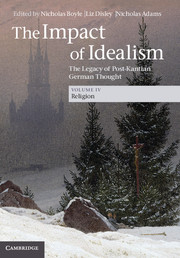Book contents
- Frontmatter
- Contents
- List of Contributors
- Acknowledgements
- List of Abbreviations
- Introduction: the impact of Idealism on religion
- 1 The impact of Idealism on Christology: from Hegel to Tillich
- 2 German Idealism's Trinitarian legacy: the nineteenth century
- 3 German Idealism's Trinitarian legacy: the twentieth century
- 4 Kierkegaard, Hegelianism and the theology of the paradox
- 5 Biblical hermeneutics: from Kant to Gadamer
- 6 Aesthetic Idealism and its relation to theological formation: reception and critique
- 7 The autonomy of theology and the impact of Idealism: from Hegel to radical orthodoxy
- 8 Faith and reason
- 9 Rabbinic Idealism and Kabbalistic realism: Jewish dimensions of Idealism and Idealist dimensions of Judaism
- 10 ‘In the arms of gods’: Schelling, Hegel and the problem of mythology
- 11 Dialectic and analogy: a theological legacy
- Bibliography
- Index
- References
6 - Aesthetic Idealism and its relation to theological formation: reception and critique
Published online by Cambridge University Press: 05 December 2013
- Frontmatter
- Contents
- List of Contributors
- Acknowledgements
- List of Abbreviations
- Introduction: the impact of Idealism on religion
- 1 The impact of Idealism on Christology: from Hegel to Tillich
- 2 German Idealism's Trinitarian legacy: the nineteenth century
- 3 German Idealism's Trinitarian legacy: the twentieth century
- 4 Kierkegaard, Hegelianism and the theology of the paradox
- 5 Biblical hermeneutics: from Kant to Gadamer
- 6 Aesthetic Idealism and its relation to theological formation: reception and critique
- 7 The autonomy of theology and the impact of Idealism: from Hegel to radical orthodoxy
- 8 Faith and reason
- 9 Rabbinic Idealism and Kabbalistic realism: Jewish dimensions of Idealism and Idealist dimensions of Judaism
- 10 ‘In the arms of gods’: Schelling, Hegel and the problem of mythology
- 11 Dialectic and analogy: a theological legacy
- Bibliography
- Index
- References
Summary
Under the heading of ‘aesthetic Idealism’ I mean to investigate accounts of becoming, plurality and division as well as being, unity and totality. My concern is not with aesthetic theory: ‘aesthetic’ qualifies and inflects a determinate slice of post-Kantian enquiry whose attention has shifted from issues of the applications of categories to the manifold of appearance to a set of meta-philosophical issues. These involve the reception of Spinoza. Obviously, there are some figures with claims to be counted as German Idealists to which the adjective ‘aesthetic’ fairly clearly applies. Given the rich commentary tradition on the evolution of the thought of both Hegel and Schelling, it is evident that the agenda, which H. S. Harris refers to as the ‘resumption of the whole into one’, engages both forms of thought, even if Schelling gets off to a much quicker start. There are other thinkers to whom the attribution of ‘aesthetic Idealism’ also applies, even if less obviously so. Dieter Henrich has made the case that one better appreciates Hölderlin by seeing him among the Idealists. The central justification, Henrich offers, for counting Hölderlin with or among the Idealists are the poet's fragmentary metaphilosophical reflections, which antedate the creation of his major poetry, and which seem to elect literature as the more appropriate venue to attempt to comprehend time and history felt as burden and opportunity, plurality experienced as a profound but intriguing challenge and division acknowledged to be a potential blessing even if immediately it is experienced as a curse.
For reasons of space I shall consider just Hegel and Hölderlin. In the case of Hegel, I privilege the Phenomenology of Spirit, Encyclopaedia of the Philosophical Sciences and Lectures on the Philosophy of Religion, although I will treat other texts of Hegel in passing. In the case of Hölderlin, the foundational texts include the metaphilosophical text fragments ‘Judgement and being’ (Urteil und Sein), representative poems such as ‘When on a holiday’, ‘Patmos’, ‘Bread and Wine’, and ‘The Only One’, although again, on a need basis, I will extend discussion beyond these poems.
- Type
- Chapter
- Information
- The Impact of IdealismThe Legacy of Post-Kantian German Thought, pp. 142 - 166Publisher: Cambridge University PressPrint publication year: 2013

